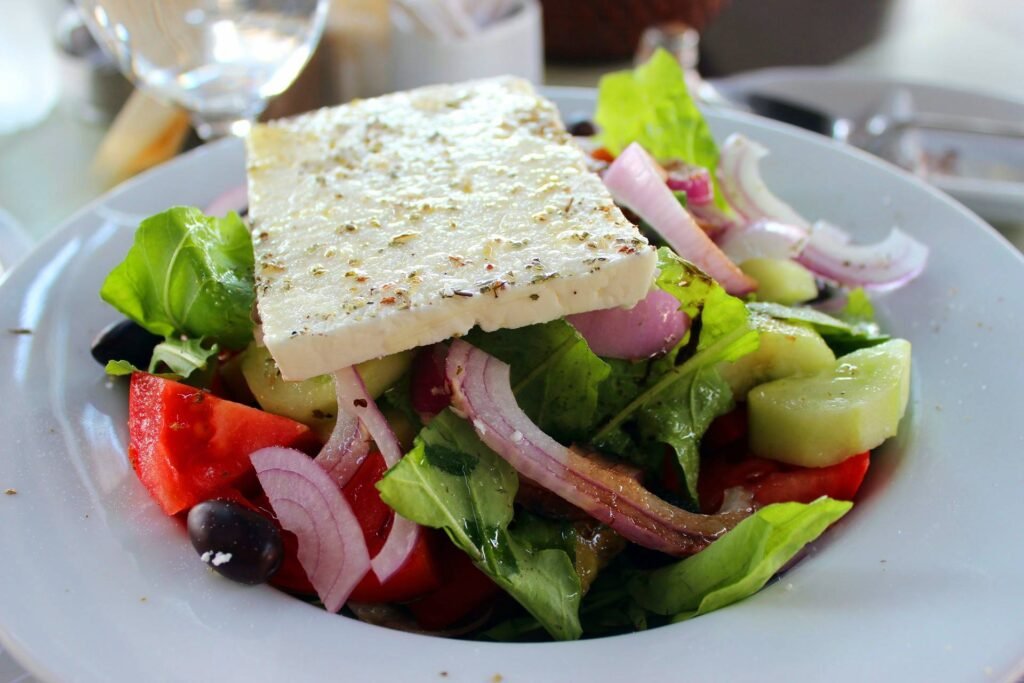Pregnancy is a time of excitement, anticipation, and often a lot of questions—especially when it comes to what you can and can’t eat. Among the many dietary dilemmas, one common question is, Can you eat feta cheese while pregnant? The answer isn’t always straightforward, as it involves understanding what makes feta cheese unique, the potential risks it may pose, and how to safely enjoy it during pregnancy.
In this article, we’ll dive deep into the world of feta cheese, examining its origins, how it’s made, and the health concerns associated with eating soft cheeses while pregnant. We’ll also provide tips on how to safely include feta in your diet and explore some delicious, pregnancy-friendly feta recipes. Let’s get started!
What Is Feta Cheese?
Feta cheese is a brined curd cheese traditionally made from sheep’s milk or a combination of sheep’s and goat’s milk. Originating in Greece, feta is known for its tangy flavour and crumbly texture, making it a popular choice in salads, pastries, and various Mediterranean dishes.
Unlike hard cheeses, which are aged for long periods, feta is a soft cheese that’s typically aged for just a few months. This short aging process, combined with its moisture content, gives feta its characteristic softness but also makes it more prone to bacterial contamination if not produced under the right conditions.
Why Is Feta Cheese a Concern During Pregnancy?
The primary concern with feta cheese during pregnancy relates to the risk of Listeria monocytogenes, a type of bacteria that can lead to listeriosis, a serious infection. Listeriosis can cause severe complications during pregnancy, including miscarriage, stillbirth, premature delivery, or life-threatening infections in newborns.
Listeria is more likely to be found in soft cheeses made from unpasteurised milk, which is why pregnant women are often advised to avoid such products. While pasteurisation, a process that involves heating the milk to a specific temperature to kill harmful bacteria, can significantly reduce the risk, the question remains: Is feta cheese safe to eat during pregnancy?
Pasteurised vs. Unpasteurised Feta Cheese
Understanding the difference between pasteurised and unpasteurised cheese is crucial when determining whether feta is safe for pregnant women.
- Unpasteurised Feta Cheese: This type of feta is made from raw milk that hasn’t been heated to kill bacteria. It poses a higher risk of containing Listeria and other harmful bacteria. Therefore, unpasteurised feta cheese is generally considered unsafe for pregnant women.
- Pasteurised Feta Cheese: Feta made from pasteurised milk has undergone a process that kills most of the harmful bacteria, including Listeria. While pasteurisation greatly reduces the risk, it doesn’t eliminate it entirely. However, pasteurised feta cheese is widely regarded as safe for consumption during pregnancy, provided it’s handled and stored properly.
How to Determine if Feta Cheese Is Safe to Eat
When shopping for feta cheese, it’s essential to check the label for the word “pasteurised.” This will indicate that the milk used to make the cheese has been heated to kill harmful bacteria. However, there are a few additional tips to ensure that the feta cheese you’re consuming is safe:
- Buy from Reputable Sources: Purchase feta cheese from trusted brands and stores. Well-known brands are more likely to adhere to strict safety standards during production.
- Check the Packaging: Ensure that the cheese is properly sealed and stored in the refrigerated section. Avoid buying cheese that appears to have been tampered with or is past its expiration date.
- Opt for Harder Feta Varieties: Some types of feta are firmer and less moist, which may reduce the risk of bacterial growth. These varieties are often aged longer and have a lower water content, making them a safer choice.
- Cook Feta to Further Reduce Risk: If you’re still concerned about consuming feta, cooking it can provide an additional layer of safety. Listeria bacteria cannot survive at high temperatures, so baked or grilled dishes containing feta are generally safe.
The Nutritional Benefits of Feta Cheese During Pregnancy
If you’ve determined that your feta cheese is pasteurised and safe to eat, you can enjoy it in moderation while reaping its nutritional benefits. Feta cheese offers several health advantages, particularly during pregnancy:
- Rich in Calcium: Feta cheese is an excellent source of calcium, which is crucial for the development of your baby’s bones and teeth. It also helps maintain your bone health during pregnancy.
- High in Protein: Feta provides a good amount of protein, essential for the growth and development of your baby’s tissues and organs.
- Contains Healthy Fats: The fats in feta cheese are beneficial for brain development and provide a source of energy.
- Provides Essential Vitamins: Feta cheese contains important vitamins like vitamin B12, which supports the nervous system and aids in the production of red blood cells, and riboflavin (B2), which helps with energy metabolism.
How Much Feta Cheese Can You Eat During Pregnancy?
While feta cheese can be a healthy addition to your pregnancy diet, moderation is key. Here are some guidelines to help you safely enjoy feta:
- Limit Portions: A serving size of feta cheese is typically around 1 ounce (28 grams). It’s best to stick to one serving per day to avoid excessive intake of saturated fat and sodium, which are present in higher amounts in feta.
- Balance with Other Foods: Incorporate feta cheese into a balanced diet that includes a variety of fruits, vegetables, whole grains, and lean proteins. This will ensure that you’re getting all the necessary nutrients without over-relying on one food source.
- Be Mindful of Sodium: Feta cheese is relatively high in sodium, which can contribute to high blood pressure if consumed in excess. Pregnant women should be particularly cautious about their sodium intake, as pregnancy can increase the risk of hypertension.
Delicious and Safe Ways to Enjoy Feta Cheese During Pregnancy
If you’re craving feta cheese, there are plenty of pregnancy-friendly ways to incorporate it into your meals. Here are some delicious ideas:
1. Greek Salad with Pasteurised Feta
A classic Greek salad with cucumbers, tomatoes, olives, and pasteurised feta cheese is a refreshing and nutritious option. Ensure that all vegetables are thoroughly washed, and opt for pasteurised feta to make this dish safe.
2. Baked Feta with Vegetables
Baking feta cheese with a mix of colourful vegetables like bell peppers, zucchini, and cherry tomatoes not only enhances the flavours but also ensures the cheese is thoroughly cooked, reducing any potential risks.
3. Spinach and Feta Stuffed Chicken
Stuffing chicken breasts with a mixture of spinach and feta cheese makes for a protein-packed meal that’s both satisfying and safe. Baking the chicken ensures that the feta is heated through.
4. Feta and Tomato Pasta
A simple pasta dish with a light tomato sauce, fresh basil, and crumbled feta is quick to prepare and full of flavour. Ensure the feta is pasteurised, and enjoy it in moderation.
5. Feta and Watermelon Salad
For a sweet and savoury treat, combine cubes of watermelon with crumbled feta and a sprinkle of fresh mint. This salad is refreshing and provides a burst of hydration, perfect for a summer pregnancy.
What to Do If You’ve Accidentally Eaten Unpasteurised Feta
If you realise after the fact that you’ve consumed unpasteurised feta cheese, it’s natural to feel concerned. However, it’s important to remain calm and take the following steps:
- Monitor for Symptoms: Watch for signs of listeriosis, which may include fever, muscle aches, nausea, and diarrhea. Symptoms can appear within a few days to weeks after exposure.
- Contact Your Healthcare Provider: If you develop any symptoms or are worried about potential exposure, contact your healthcare provider immediately. They may recommend tests or treatment if necessary.
- Stay Informed: Understanding the risks and symptoms of listeriosis can help you stay vigilant during pregnancy. However, it’s worth noting that the risk of contracting listeriosis from unpasteurised cheese is relatively low, though still significant enough to warrant caution.
Common Myths About Feta Cheese and Pregnancy
There are several myths and misconceptions surrounding feta cheese and pregnancy. Let’s debunk a few of them:
Myth 1: All Soft Cheeses Are Unsafe During Pregnancy
While it’s true that some soft cheeses made from unpasteurised milk pose a risk, many soft cheeses, including feta, are safe to eat if made from pasteurised milk. Always check the label to be sure.
Myth 2: You Should Avoid Cheese Altogether During Pregnancy
Cheese can be a nutritious part of a pregnancy diet, offering valuable nutrients like calcium and protein. The key is to choose safe, pasteurised varieties and consume them in moderation.
Myth 3: Cooking Doesn’t Make Cheese Safer
Cooking cheese at high temperatures can kill harmful bacteria, making dishes that include cooked feta cheese a safe option during pregnancy.
Myth 4: Feta Cheese from Restaurants Is Always Unsafe
Many restaurants use pasteurised feta cheese, but it’s always a good idea to ask your server to confirm. Don’t hesitate to inquire about the type of cheese used in dishes when dining out.
Conclusion: Enjoy Feta Cheese Safely During Pregnancy
So, can you eat feta cheese while pregnant? The answer is yes, as long as the feta is made from pasteurized milk and handled safely. Feta cheese can be a nutritious and tasty addition to your pregnancy diet, offering essential nutrients like calcium, protein, and vitamins. By following the guidelines provided in this article, you can

